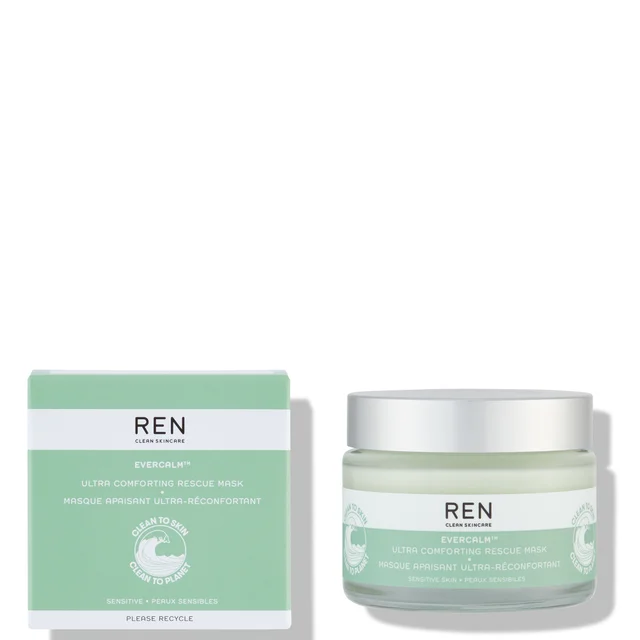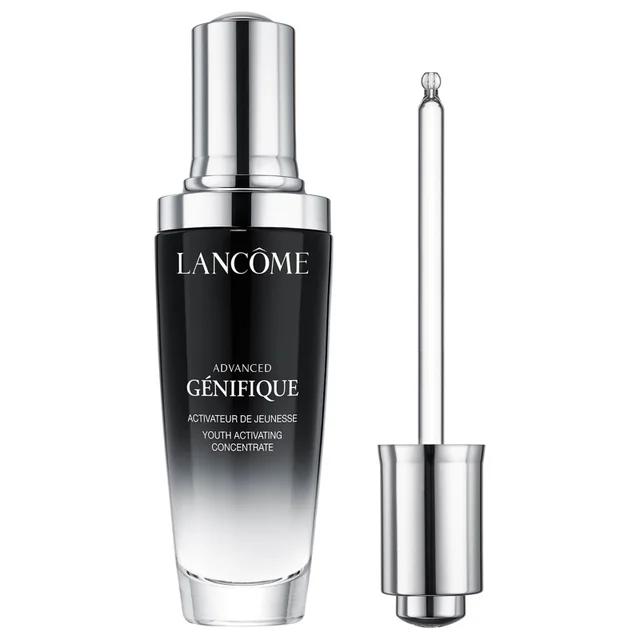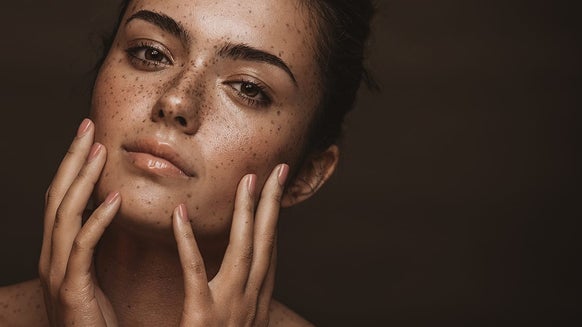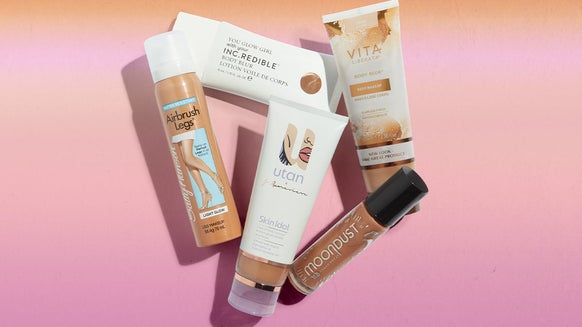How does stress affect your skin?

There's nothing worse, when you're already stressed, than that new blemish popping up on your forehead to add to your worries. If you have been breaking out lately or noticing that your usual glow is gone, then it could be a sign that you're in need of some relaxation. We spoke to Charlotte Ferguson, founder of DISCIPLE Skincare on the link between stress and skin health, and her advice on how to take some time out to restore balance to the body and mind.
What is stress?
"Stress is how we react when we feel under pressure" explains Charlotte. "It usually happens when we are in a situation that we don't feel we can manage or control" she adds.
What causes stress?
"Many things can cause stress. You might feel stressed because of a big event or situation in your life. Or it might be a build-up of lots of smaller things – day to day life can be stressful especially when we don’t have coping tools and strategies in place to help" says Charlotte.
What impact can stress and anxiety have on the skin?
"This is something I spent a lot of time researching and laid the foundations for launching Disciple" admits Charlotte. "When we experience stress or anxiety, our body releases the stress hormone cortisol; this is a natural hormone that helps the body deal with stress. In small doses, cortisol can serve as a great biological coping mechanism but if our body is exposed to persistent high levels of cortisol, it can start to negatively impact your skin. Stress and anxiety can cause chronic inflammation in the body which cause cortisol spikes and encourage your sebaceous glands (oil glands) to produce more thick and sticky oil. Dead skin then stick to this oil and blocks your pores. This also stimulates the growth of ‘bad’ bacteria, creating the perfect storm for spots and breakouts" explains Charlotte.
Acne
"Stress and anxiety cause chronic inflammation in the body which cause cortisol spikes and encourage your sebaceous glans to produce more thick and sticky oil which dead skin sticks to and blocks pores. It also encourages bad bacteria growth making it the perfect environment for breakouts".
Inflammatory conditions including
"Cortisol also causes eczema and psoriasis to flare up and reduced collagen production makes it harder for inflamed skin to heal" clarifies Charlotte.
Premature ageing
"Cortisol also has the power to accelerate the ageing process of the skin, rapidly increasing ageing signs like lines and wrinkles, pigmentation, brightness and firmness. When cortisol is high, we see a drop in the production of the anti-ageing hormone known as DHEA (dehydroepiandrosterone). We have naturally high levels of DHEA when we are young, but this begins to drop from the age of 20. Low DHEA is associated with loss of muscle mass, strength, and stamina – sometimes resulting in low sex drive and sleep problems, tiredness and poor memory. If you want to support DHEA production in the body, lowering cortisol is vital" says Charlotte.
Skin picking
In addition to stress presenting itself physically on the skin, Charlotte explains that behaviours such as skin picking can arise as a result of stress. "Skin picking can develop into a form of OCD, which means that there is a level of stress/anxiety relief from picking the skin. It can feel good and productive temporarily, but then means that you have to do more and more as a stress coping strategy. Obviously this can result in infection, scarring and worse. It really is a vicious cycle and it’s all about replacing this anxiety relief cycle with something healthier and less harmful. That’s where good psychotherapy can really help" advises Charlotte.
How to reduce stress
"There are many things that you can do to reduce stress such as meditation, setting firmer boundaries, exercise, being in nature and getting a good nights sleep – that means switching the phone off at least 1 hour before bed" says Charlotte. She outlines some effective ways to reduce stress levels:
Adaptogens
"Adaptogens are group of herbs or plant extracts that have health and de-stressing benefits. They have a variety of perks, including helping you deal with fatigue, stress and anxiety. The theory behind adaptogens says they help your body adjust to physical, chemical, or biological stress. They're thought to stimulate your body's stress-protection response and help its systems return to a balanced state called "homeostasis." These herbs aid our bodies in reacting to and recovering from short- and long-term physical or mental stress. Some also boost immunity and overall well-being. Adaptogens can combat fatigue, enhance mental performance, ease depression and anxiety, and help you thrive".
Go outside
"Spending time in nature can help relieve stress, worry and anxiety. It improves your mood and boost feelings of happiness and wellbeing. Whatever you call it, forest bathing, ecotherapy or nature mindfulness, we evolved in the great outdoors, and your brain benefits from time in nature. Even if you live in the city, taking 15 mins to sit in your nearest park with your bare feet on the grass can make a huge difference to adrenaline and cortisol levels in the body. During particularly stressful periods at work, even going outside and getting a walk around the block can make a huge difference" suggests Charlotte.
Hormone support
"Hormones play a key part in our overall health" clarifies Charlotte. "Hormone imbalances can affect us mentally, physically and emotionally. Incorporating adaptogens such as ashwagandha into your lifestyle can help your emotions feel more balanced. Adaptogenic herbs directly affect your endocrine system, which is responsible for your hormones. Your cells will react by making more or less of certain hormones to balance everything. Geranium is a stimulant of the adrenal cortex which produces a number of different corticosteroid hormones. This is why geranium essential oil can be helpful to relieve premenstrual tension, menopause and hormonal imbalances. It is very effective for bloating and swelling prior to or during menstrual cycle. Geranium has a stimulating effect on the lymphatic system and can be very useful in reducing fluid retention through its regulating action".
Sleep
An obvious but easily overlooked way to reduce stress, Charlotte stresses "getting a good nights sleep should be a top priority - sleep affects everything! Too much sleep will have you feeling groggy first thing and too little sleep will leave you restless, irritable and unable to concentrate. If you’re struggling to feel rested, it’s probably because you’re not unwinding after stressful days and your body is holding on to that stress and negative thoughts. Using CBD Miracle patch is an easy way to help the mind switch off before bed – it delivers 8mg of CBD into the blood stream over 24 hours".
Essential oils
Charlotte strongly advises using essential oils as a natural way to help alleviate stress and anxiety. "One of the major components of our fave geranium essential oil are the terpenes, these aid stress relief and can help to reduce any anxious thoughts. To de-stress, try diffusing this potent essential oil; during inhalation, the odour molecules travel through the nose and directly to the brain, that’s why what you smell can trigger memories and elicit feelings.
How to treat stressed skin
"Adopting a grounding skincare routine is hugely important for both your skin and wellbeing, taking time out of your day to connect with yourself can be hugely therapeutic" begins Charlotte.
Be gentle
"Skin often becomes more sensitive when stressed, so look for skincare that's simple and fragrance-free. You're also more likely to feel sensitive to pain when anxious, as your immune system is lowered, so avoid painful extractions during stressful times as well" says Charlotte.
Adaptogens and CBD
"Look out for products rich in adaptogens, essential fatty acids, CBD and probiotics. As mentioned earlier, the stress hormone cortisol can clog pores and make sebum thicker; these formulations assist in lowering cortisol levels in the body and supporting balance in the skin" explains Charlotte.
"Products like our Dreamy Skin for instance contains Rosehip Seed Oil (packed with essential fatty acids) Vitamin A, prebiotic Burdock Root and a soothing essential oil blend of Chamomile, Jasmine and Frankincense and leaves your skin smoother and firmer. It’s clever formula facilitates skin cell regeneration whilst you sleep, reducing pigmentation, pore size and fine lines too".

Our team of beauty experts cover everything from makeup to skincare, picking out the most effective products from the best brands and latest trends. Stay up to date on everything beauty with the LOOKFANTASTIC blog, and find all your essentials in one place.





























